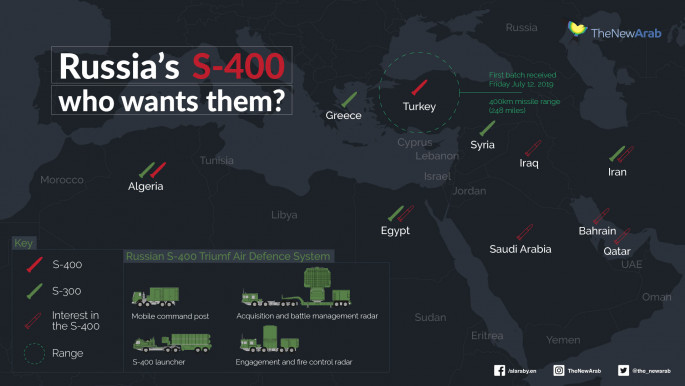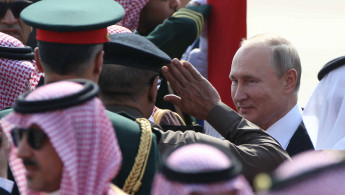Russia, Saudi Arabia seal key oil deal during Putin visit
Putin's visit follows attacks on Saudi oil installations that Saudi Arabia and the US have blamed on Iran, an ally of Moscow.
Following talks between Putin and Saudi King Salman, the two countries signed some 20 agreements and contracts worth billions of dollars on aerospace, culture, health, advanced technology and agriculture.
Key among the deals was the agreement to bolster cooperation among the so-called OPEC+ countries - the Organisation of the Petroleum Exporting Countries plus 10 non-members of the cartel.
Moscow is not a member of OPEC, but it has worked closely with the group to limit supply and push up prices after a 2014 slump that wreaked havoc on the economies of Russia and cartel heavyweight Saudi Arabia.
Monday's deal seeks to "reinforce cooperation ... and strengthen oil market stability", Saudi Energy Minister Prince Abdulaziz bin Salman said at the signing ceremony.
Kremlin spokesman Dmitri Peskov told reporters that Putin and Saudi officials also discussed "military and technical cooperation".
 |
In October 2017, Russia and Saudi Arabia signed a memorandum of understanding paving the way for Riyadh's purchase of Moscow's powerful S-400 anti-aircraft missile systems.
The sale never materialised, however, as Saudi Arabia eventually opted to purchase a US system.
Role of 'peacemaker'
On Monday, Putin said "Russia attaches particular importance to the development of friendly, and mutually beneficial ties with Saudi Arabia".
King Salman told Putin: "We look forward to working with Your Excellency on everything that will bring security, stability and peace, confront extremism and terrorism and promote economic growth."
Moscow and Riyadh, a traditional US ally, have made a striking rapprochement in recent years, marked in particular by King Salman's first visit to Russia in October 2017.
Read also: Putin's trip to Riyadh could provide hints on the next chapter of Russia-Saudi ties
A year later, when Saudi Crown Prince Mohamed bin Salman was under fire over the assassination of dissident journalist Jamal Khashoggi in Istanbul, Putin went out of his way to shake his hand at a G20 summit, to much comment.
In an interview with Arabic-language television channels ahead of his visit, Putin praised his good relations with the Saudi royals.
|
"We will absolutely work with Saudi Arabia and our other partners and friends in the Arab world... to reduce to zero any attempt to destabilise the oil market," he said.
Russian political analyst Fyodor Lukyanov said Moscow, with its older ties to Iran and new links with Saudi Arabia, could "play the role of peacemaker" as tensions soar between Tehran and Riyadh.
These tensions spiked last month after the attacks on Saudi oil facilities that halved the kingdom's crude output and set oil markets alight.
Yemen's Iran-backed Houthi rebels claimed responsibility, but US officials blamed Tehran, charging that the rebels did not have the range or sophistication to target the facilities.
Tehran has denied involvement and warned of "total war" in the event of any attack on its territory.
Syria war
Russia has sought to keep a foot in both camps, offering missiles to Riyadh to defend itself, while at the same time warning against "hasty conclusions" regarding Iran's alleged involvement.
Last week, an Iranian tanker was hit in suspected missile strikes off the coast of Saudi Arabia, sparking fresh fears of war.
Putin held talks with the crown prince late Monday do discuss "bilateral cooperation" and developments in Syria and Yemen.
Russia and Iran back Syrian President Bashar al-Assad, while the Saudis support the opposition seeking his ouster.
Read also: How Saudi Aramco is powering the global climate crisis
But "it is important for Russia that an Arab country participates in the political settlement in Syria", said Lukyanov.
For now "only three non-Arab countries" - Turkey, Russia and Iran - are hosting talks, the analyst added.
After Saudi Arabia, Putin will travel to the UAE on Tuesday to meet the powerful crown prince of Abu Dhabi, Mohammed bin Zayed Al-Nahyan.
Follow us on Twitter: @The_NewArab





 Follow the Middle East's top stories in English at The New Arab on Google News
Follow the Middle East's top stories in English at The New Arab on Google News
![Netanyahu furiously denounced the ICC [Getty]](/sites/default/files/styles/image_330x185/public/2024-11/GettyImages-2169352575.jpg?h=199d8c1f&itok=-vRiruf5)
![Both Hamas and the Palestinian Authority welcomed the ICC arrest warrants [Getty]](/sites/default/files/styles/image_330x185/public/2024-11/GettyImages-2178351173.jpg?h=199d8c1f&itok=TV858iVg)
